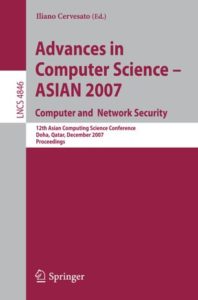Publications
Filter by type:

On axiomatizations of public announcement logic
Abstract. In the literature, different axiomatizations of Public Announcement Logic (PAL) have been proposed. Most of these axiomatizations share a “core set” of the so-called “reduction axioms”. In this paper, by designing non-standard Kripke semantics for the language of PAL, we show that the proof system based on this core set of axioms does not completely axiomatize PAL without additional axioms and rules. In fact, many of the intuitive axioms and rules we took for granted could not be derived from the core set. Moreover, we also propose and advocate an alternative yet meaningful axiomatization of PAL without the reduction axioms. The completeness is proved directly by a detour method using the canonical model where announcements are treated as merely labels for modalities as in normal modal logics. This new axiomatization and its completeness proof may sharpen our understanding of PAL and can be adapted to other dynamic epistemic logics.
(largely extended journal version of the LORI2011 paper)

Knowing that, knowing what, and public communication: Public announcement logic with Kv operators

An alternative axiomatization of DEL and its applications
A note on equivalence of two semantics for epistemic logic of shallow depths
This short note establishes the equivalence of the indexed semantics by Wang (2006) and the epistemic world semantics of Kaneko and Suzuki (2003) for epistemic logic of bounded depths.
In A Festschrift for Jeroen Groenendijk, Martin Stokhof, and Frank Veltman (2013)
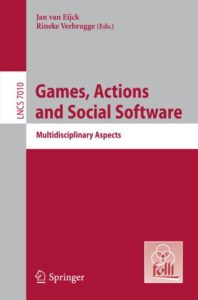
On the logic of lying

Not All Those Who Wander Are Lost: Dynamic Epistemic Reasoning in Navigation
Abstract. In everyday life, people get lost even when they have the map: they simply may not know where they are in the map. However, when moving forward they may have new observations which can help to locate themselves by reasoning. In this paper, we propose and develop a semantic-driven dynamic epistemic framework to handle epistemic reasoning in such navigation scenarios. Our framework can be viewed as a careful blend of dynamic epistemic logic and epistemic temporal logic, thus enjoying features from both frameworks. We made an in-depth study on many model theoretical aspects of the proposed framework and provide a complete axiomatization.

Reasoning about protocol change and knowledge
Abstract. In social interactions, protocols govern our behavior and assign meaning to actions. In this paper, we investigate the dynamics of protocols and their epistemic effects. We develop two logics, inspired by Propositional Dynamic Logic (PDL) and Public Announcement Logic (PAL), for reasoning about protocol change and knowledge updates. We show that these two logics can be translated back to the standard PDL and PAL respectively.
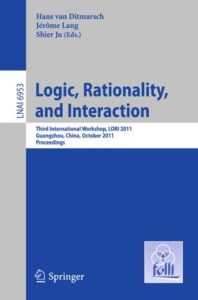
On axiomatizations of PAL
Abstract. In the literature, different axiomatizations of Public Announcement Logic (PAL) were proposed. Most of these axiomatizations share a ‘core set’ of the so-called reduction axioms. In particular, there is a composition axiom which stipulates how two consecutive announcements are composed into one. In this paper, by designing non-standard Kripke semantics for the language of PAL, we show that without the composition axiom the core set does not completely axiomatize PAL. In fact, most of the intuitive ‘axioms’ and rules we took for granted could not be derived from the core set. The non-standard semantics we proposed is of its own interest in modelling realistic agents. We show that with the help of different composition axioms we may axiomatize PAL w.r.t. such non-standard semantics.
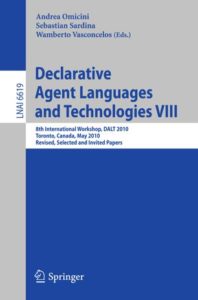
Logic of information flow on communication channels (full paper)
Abstract. In this paper, we develop an epistemic logic for specifying and reasoning about information flow on the underlying communication channels. By combining ideas from Dynamic Epistemic Logic (DEL) and Interpreted Systems (IS), our semantics offers a natural and neat way of modeling multi-agent communication scenarios with different assumptions about the observational power of agents. We relate our logic to the standard DEL and IS approaches and demonstrate its use by studying a telephone call communication scenario.
Abstract appeared at AAMAS2010
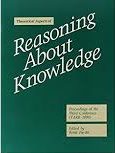
Hidden protocols
When agents know a protocol, this leads them to have expectations about future observations. Agents can update their knowledge by matching their actual observations with the expected ones. They eliminate states where they do not match. In this paper, we study how agents perceive protocols that are not commonly known, and propose a logic to reason about knowledge in such scenarios.
(largely extended journal version of the TARK2011 paper)
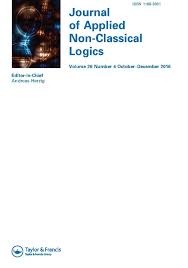
Composing models
Abstract. We propose and study a new composition operation on (epistemic) multi-agent models with different vocabularies of propositional letters. This operation allows us to compose large models by small components representing agents’ partial observational information. Our investigation provides ways to decompose (locally generated) epistemic models such that the truth of certain formulas are preserved. By using the composition operation we also propose and study action model composition and action model updates on models with arbitrary vocabularies.
A preliminary version of this paper was presented at LOFT 2010.

To know or not to know: Epistemic approaches to security protocol verification
Abstract. Security properties naturally combine temporal aspects of protocols with aspects of knowledge of the agents. Since BAN-logic, there have been several initiatives and attempts to incorporate epistemics into the analysis of security protocols. In this paper, we give an overview of work in the field and present it in a unified perspective, with comparisons on technical subtleties that have been employed in different approaches. Also, we study to which degree the use of epistemics is essential for the analysis of security protocols. We look for formal conditions under which knowledge modalities can bring extra expressive power to pure temporal languages. On the other hand, we discuss the cost of the epistemic operators in terms of model checking complexity.

Epistemic Modelling and Protocol Dynamics

Verifying epistemic protocols under common knowledge
Abstract. Epistemic protocols are communication protocols aiming at transfer of knowledge in a controlled way. Typically, the preconditions or goals for protocol actions depend on the knowledge of agents, often in nested form. Informal epistemic protocol descriptions for muddy children, coordinated attack, dining cryptographers, Russian cards, secret key exchange are well known. The contribution of this paper is a formal study of a natural requirement on epistemic protocols, that the contents of the protocol can be assumed to be common knowledge. By formalizing this requirement we can prove that there can be no unbiased deterministic protocol for the Russian cards problem. For purposes of our formal analysis we introduce an epistemic protocol language, and we show that its model checking problem is decidable.
In computer science, various logical languages are defined to analyze the properties of systems. One way to pinpoint the essential differences between those logics is to compare their expressivity in terms of distinguishing power and expressive power. In this paper, we study those two concepts by regarding the latter notion as the former lifted to classes of models. We show some general results on lifting an invariance relation on models to one on classes of models, such that when the former corresponds to the distinguishing power of a logic, the latter corresponds to its expressive power, given certain compactness requirements. In particular, we introduce the notion of class bisimulation to capture the expressive power of modal logics. We demonstrate the application of our results by revisiting modal definability with our new insights.
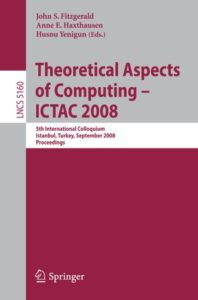
Refinement of Kripke Models for dynamics
Abstract. We propose a property-preserving refinement/abstraction theory for Kripke Modal Labelled Transition Systems incorporating not only state mapping but also label and proposition lumping, in order to have a compact but informative abstraction. We develop a 3-valued version of Public Announcement Logic (PAL) which has a dynamic operator that changes the model in the spirit of public broadcasting. We prove that the refinement relation on static models assures us to safely reason about any dynamic properties in terms of PAL-formulas on the abstraction of a model. The theory is in particular interesting and applicable for an epistemic setting as the example of the Muddy Children puzzle shows, especially in the view of the growing interest for epistemic modelling and (automatic) verification of communication protocols.
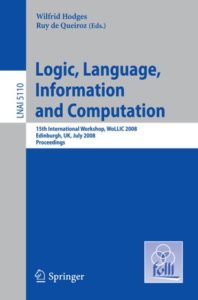
Propositional dynamic logic as a logic of belief revision
PDL over accelerated labeled transition systems
Abstract. We present a thorough study of Propositional Dynamic Logic over a variation of labeled transition systems, called accelerated labelled transition systems, which are transition systems labeled with regular expressions over action labels. We study the model checking and satisfiability decision problems. Through a notion of regular expression rewriting, we reduce these two problems to the corresponding ones of PDL in the traditional semantics (w.r.t. LTS). As for the complexity, both of problems are proved to be EXPSPACE-complete. Moreover, the program, complexity of model checking problem turns out to be Nlogspace-complete. Furthermore, we provide an axiomatization for PDL which involves Kleene Algebra as an Oracle. The soundness and completeness are shown.
